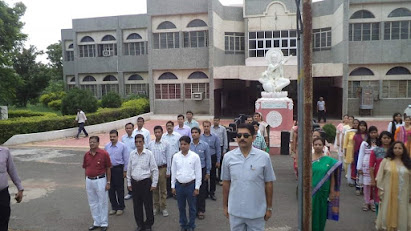Evolution of Education Policy:
University Education Commission (1948-49).
•Secondary Education Commission (1952-53)
•Education Commission (1964-66) under Dr. D.S. Kothari
•National Policy on Education, 1968
•42nd Constitutional Amendment,1976-Education in Concurrent List
•National Policy on Education (NPE), 1986
•NPE 1986 Modified in 1992 (Program of Action, 1992)
•T.S.R. Subramaniam Committee Report (27 May, 2016)
• Dr. K. Kasturirangan Committee Report (31 May, 2019).
NEP 2020 : Consultation Process
Online : www.MyGov.in (26.01.2015 – 31.10.2015)
• Nearly 2.5 lakhs Gram Panchayats, 6600 Blocks, 6000 ULBs, 676 Districts (MayOct. 2015)
• Draft NEP, 2019 Summary in 22 languages/Audio Book
• Education Dialogue with MPs (AP, Kerala, Telangana, TN, Puducherry, Karnataka &
Odisha)
• Special Meeting of CABE (21.09.2019)
• Parliamentary Standing Committee on HRD on 07.11.2019
........................................................................................
Major Reforms : Higher Education:
50 % Gross Enrolment Ratio by 2035
• Holistic and Multidisciplinary Education -Flexibility of Subjects
• Multiple Entry / Exit
• UG Program - 3 or 4 year
• PG Program – 1 or 2 year
• Integrated 5 year Bachelor’s / Master’s
• M Phil to be discontinued
• Credit Transfer and Academic Bank of Credits
• HEIs : Research Intensive/Teaching Intensive Universities and
Autonomous Degree Granting Colleges
• Model Multidisciplinary Education and Research University (MERU)
(in or near every District)
4
M
Major Reforms : Higher Education:
- Graded Autonomy : Academic, Administrative & Financial
- • Phasing out Affiliation System in 15 years
- • National Mission on Mentoring
- • Independent Board of Governors (BoG)
- • Single Regulator for Higher Education (excluding Legal and Medical)
- • On-line Self Disclosure based Transparent System for Approvals in place of
‘Inspections’
- • Common Norms for Public and Private HEIs
- • Private Philanthropic Partnership
- • Fee fixation within Broad Regulatory Framework
- • Public Investment in Education Sector to reach 6% of GDP at the earliest
- National Research Foundation (NRF)
- • Internationalisation of Education
- • Integration of Vocational, Teacher and Professional Education
- • Setting up of New Quality HEIs has been made Easier
- • Standalone HEIs and Professional Education Institutions will evolve into
Multidisciplinary
- • Special Education Zone for Disadvantaged Regions
- • National Institute for Pali, Persian and Prakrit
- • National Educational Technology Forum (NETF)
- • MHRD to be renamed as M/o Education
Indian Knowledge Systems, Languages, Culture and Values:
• Focus on Literature & Scientific Vocabulary of Indian Languages
• Language Faculty
• Research on Languages
• Strengthening National Institutes for promotion of Classical
Languages & Literature
• Indian Institute of Translation and Interpretation (IITI)
• Cultural Awareness of our Indian Knowledge Systems
• Promoting Traditional Arts / Lok Vidya
• HEI / School or School Complex to have Artist(s)-in-Residence
Use of Technology:
• Use of Technology in
• Education Planning
• Teaching, Learning & Assessment
• Administration & Management
• Regulation - Self Disclosure & Minimum Human Interface
• Increasing Access for Disadvantaged Groups
• Divyang Friendly Education Software
• e-Content in Regional Languages
• Virtual Labs
• National Educational Technology Forum (NETF)
• Digitally Equipping Schools, Teachers and Students
Major Changes from NPE 1986: School:
Universalization of Early Childhood Care Education (ECCE)
• National Mission on Foundational Literacy and Numeracy
• 5+3+3+4 Curricular and Pedagogical Structure
• Curriculum to integrate 21st Century Skills, Mathematical Thinking and Scientific
temper
• No Rigid Separation between Arts & Sciences, between Curricular and extra-Curricular
activities, between Vocational and Academic streams
• Education of Gifted Children
• Gender Inclusion Fund
• KGBVs upto Grade 12
• Reduction in Curriculum to Core Concepts
• Vocational integration from class 6 onwards
Major Reforms: School Education
10
• New National Curriculum Framework for ECE, School, Teachers and Adult
Education
• Board Examination will be Low Stakes, Based on Knowledge Application
• Medium of Instruction till at least Grade 5, and preferably till Grade 8
and beyond in Home Language / Mother tongue/ Regional Language
• 360 degree Holistic Progress Card of Child
• Tracking Student Progress for Achieving Learning Outcomes
• National assessment center - PARAKH
• NTA to offer Common Entrance Exam for Admission to HEIs
• National Professional Standards for Teachers (NPST)
• Book Promotion Policy and Digital Libraries
• Transparent online self disclosure for public oversight and accountability
Major Reforms :
Outcomes of NEP 2020:
Universalization from ECCE to Secondary Education by 2030, aligning with
SDG4
• Attaining Foundational Learning & Numeracy Skills through National Mission
by 2025
• 100% GER in Pre-School to Secondary Level by 2030
• Bring Back 2 Cr Out of School Children
• Teachers to be prepared for assessment reforms by 2023
• Inclusive & Equitable Education System by 2030
• Board Exams to test core concepts and application of knowledge
• Every Child will come out of School adept in at least one Skill
• Common Standards of Learning in Public & Private Schools
Dr K Kasturirangan Committee Members :
S.No Name of the Member Contact No. Email
1 Dr. K. Kasturirangan
(Chairman)
9845007998 (Personal)
O: 080-23610522
(Direct Line- Dr
Kasturirangan)
krangank@gmail.com
2 Dr. Vasudha Kamat 9821310081(M), kamatvasudhav@gmail.com
3 Dr. Manjul Bhargava +609 2584192 bhargava@math.princeton.edu
4 Dr. Ram Shankar Kureel 07324-274 377, 9871450315(M) drrskureel@gmail.com
5 Prof. T.V. Kattimani 9599292424(M), 9425331399(M)
07629269710
tvkattimani@gmail.com
vcigntu@gmail.com
6 Shri Krishna Mohan
Tripathy
9415822107(M) kmtripathiknp@gmail.com
7 Dr. Mazhar Asif 9435118077(M), 03612672683 mazharassam@gmail.com
8 Dr. M.K. Sridhar 9845222573(M), 8048068027(M)
Escort
9900086660
bharathwaasi@gmail.com
9 Shri Rajendra Pratap
Gupta
09223344303(M) advisor.healthminister@gov.in
office.rajendra@gmail.com










































